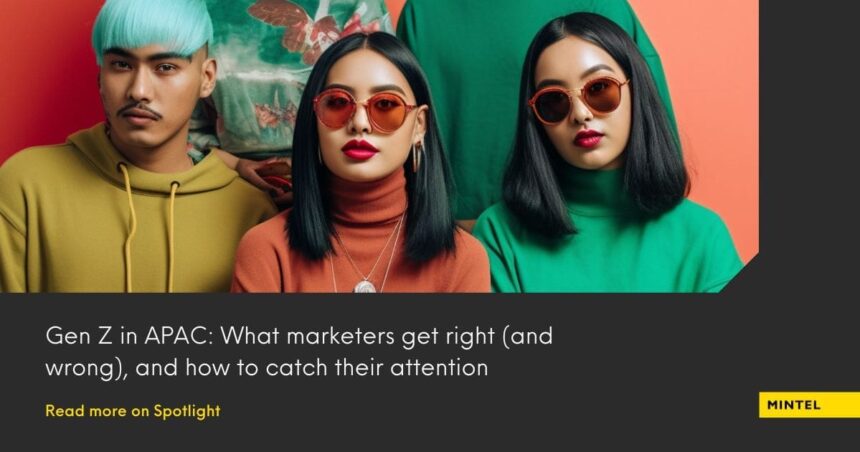Zoomers, or Gen Zers as the world knows them, are the dynamic cohort born between 1997 and 2012 who will be between the ages of 11 and 26 in 2023. According to Mintel research, Gen Z will be a crucial target market in 2030. As they transition to the primary consumer group, what truly sets them apart are their values and virtues, which are different from those of previous generations.
Globally acknowledged for their independence, sustainability consciousness, and ethical mindset, Gen Zers wield considerable influence on the evolving market landscape. While those characteristics could be relevant for Gen Z in the Western world, it’s important to note that the same demographic can be different in other parts of the globe. For instance, Indian Gen Zers aren’t as eco-conscious as their predecessors, and those in Thailand aren’t as tech-savvy. In Southeast Asia, Gen Zers are on a tight budget and want to walk away from a life dominated by the digital realm.
In this article, we’ll look at the world of Gen Z in APAC to find out what marketers are right and not so right about them, as well as learn some popular slang terms that have become a big part of their culture.
They are struggling to slay True Beauty
Amidst the escalating momentum of the self-love movement, as highlighted in Mintel Trend The Body Beautiful, Gen Z faces a constant battle with high beauty standards. It’s tough for young folks to avoid comparing themselves to those picture-perfect people they see on social media, particularly in APAC, where Gen Z is heavily influenced by both K-beauty and Western aesthetics. Hot Tweets like “Who is 25 and hasn’t gotten their face done?” which got over 1 million views in Thailand in early June 2023 can leave people who haven’t been to a beauty clinic feeling left out. And seeing their squad or fave influencers looking fire on TikTok and Instagram every day doesn’t help either.
Brands today are jumping on the bandwagon with campaigns promoting real beauty, but their voices often get drowned out by society’s relentless beauty ideals. These standards feel so unattainable like they’ve got no chill.
Businesses need to step up their game. Using diverse and inclusive imagery in ads is a step in the right direction, but it’s not enough. They need to stand up against those unrealistic beauty standards and be straight-up honest about their own beauty vibes—no cap. Gen Z needs to realise that what they see in the media isn’t always real, and they should feel confident showing off their own unique ‘rizz’.
Dove‘s ‘My Beauty. My Say’ (“我的美,我说了算”) campaign (China)
Marketers can learn from the Dove’s My Beauty, My Say campaign in China, which encouraged female consumers to take unedited photographs. It invited some female customers to view their own childhood images that had not been altered in any way. When they were little girls, they looked happy and carefree to display themselves, and remembering how that felt impacted and inspired them.
They value experiences, but not more than objects
Gen Z is often recognised for placing great value on experiences, but let’s keep it real—they’re still into those luxury products. For example, in China, more young-gen consumers, particularly those born after 1990, believe that luxury brands should get closer to the public, while more people born after 1960/70 believe the opposite. In Thailand, Gen Z is the largest generation with the goal of having enough or more money to spend on expensive goods within the next five years.
While it’s true that Gen Zers cherish memorable experiences, they’re also majorly into flexing with the latest and greatest. Constantly bombarded with social media posts flaunting the hottest possessions, they feel the pressure to keep up with the trends. Being labeled as mid or basic is the last thing they want.
And just like beauty standards, Gen Z is all about that drip to always look stylish and impressive online, which is why they can’t resist the allure of luxury brand items, trendy clothing, and cutting-edge gadgets that keep their online presence strong. But balance is the key—they need to remember to unplug from social media and touch some grass with their besties, just like what is suggested in Mintel Trend Click and Connect.
Take inspiration from Tinder, which is opening its own adult-only convenience store called SwipeMart to sell original products and serve as a meeting place for young people (Japan).
Instead of simply promoting materialism, marketers should encourage Gen Z to engage in responsible spending, celebrate self-expression, and return to the real world. Give them space to stand out from the crowd, showcase their success, and unleash their creativity. That’s the key to winning over this generation. Let’s keep it ethical, fam.
They’re not as sustainable as we think
Don’t get it twisted—Gen Z might come across as woke, but they aren’t always as sustainable as we think. It’s not about their standpoints, though; it’s the world they’re living in that makes it tough for them to be so. The struggle is real, especially when sustainable products are seen to be expensive, yet most Gen Zers in SEA are more budget-conscious than other age groups and want to stay within their budget as much as possible. How do marketers expect young people, who are still in school or just starting their grind, to afford all that?
Limited financial resources are a big issue. Some argue that those with greater resources should bear the burden of sustainability and that it doesn’t make sense to ask people who are already struggling to make ends meet to bear even more responsibilities.
The argument’s got some truth to it, but businesses can’t just sit back and chill. According to Mintel Trend Moral Brands, Gen Z is actually all about backing brands that make ethical decisions on their behalf. Brands can hype them up and make sustainability their jam because they’re the ones shaping the future. Mintel’s Navigating Affordability versus Sustainability webinar also reminds businesses that it’s not only about being sustainable: it’s about showing them that value and sustainability go hand in hand.
Frula Beauty offers an affordable nature-inspired skincare line sold only in supermarkets (New Zealand)
They’re not picky, they just prioritise their rights
People slap labels on Gen Z, calling them pessimistic, inexperienced, and overconfident. And when it comes to jobs, Gen Z doesn’t play games—they low-key hold bosses, colleagues, and companies accountable, demanding values that align and proper benefits. They keep bouncing from job to job, making older folks shake their heads.
In APAC, a significantly higher proportion of consumers aged 18-24 in New Zealand and Hong Kong strongly prefer to be associated with companies/brands that share their values than older customers according to Mintel Global Consumer. In the eyes of Gen Z, this isn’t about being picky. It’s their right to do what’s best for them rather than waste time on what isn’t, and this applies to almost anything, not just a job. And, to be honest, that’s a solid point.
So, let’s cut through the drama and learn to vibe with Gen Zers. This generation can fully connect with brands and organisations that promote flexibility and establish a healthy work-life balance. The discussion in Mintel Trend An Informal Affair nails it—a chill approach to work and life that frees up time to maintain social lives and gives that sweet balance.
See Zomato‘s The Shelter Project which creates rest stops for all delivery partners to provide clean drinking water, phone charging stations, access to restrooms, high-speed internet, and more (India)
Take a cue from RS Group, an entertainment & media company that has introduced three new equality welfare programmes that reflect diversity and equality policies (Thailand).
They’re into politics because politics is for everybody
Gen Zers are way more vocal about social movements than past generations. In this world of easy access to content on social media, they question everything, even those taboo topics, and they cherish the freedom to express themselves.
Challenging the status quo and fighting for their rights, Gen Z is making waves, and they need supporters to amplify their voices, make them stronger, and have a bigger impact. As mentioned in Mintel Trend Buydeology, they’re all about rocking with companies that share their cultural and ideological values. According to Mintel’s Global Consumer research in March 2023, a greater number of consumers aged 18-24 in Thailand, Hong Kong, and China are more strongly willing to boycott companies that behave unethically.
Gen Z simply wants to hang out with people and support brands who hold the same standpoints and share their values—passing the vibe check.
See the bakery Kumori — they’re all about voter awareness before the presidential elections. Customers can pick their dessert and match it with packaging that features the candidate they support (Philippines)
Check out The Body Shop, which pledges to support young people participating in democracy with their Be Seen, Be Heard campaign worldwide (Global).
Brands can create initiatives that let Gen Zers communicate their opinions, feelings, and ideas because that’s what they value. Show them some love and support, and you’ll earn their loyalty and investment—periodt.
What we think
Gen Z is indeed the main character of today’s business scene.
To capture APAC Gen Z’s attention, marketers must grasp the region’s distinct demographic traits, transcend stereotypes, and establish true connections on a personal level. Embracing their individuality and celebrating diversity, empowering them to challenge conventional beauty standards while giving tools to encourage self-expression and guiding them on Internet usage.
It’s also imperative for brands to present value and sustainability as an influential combination to address their financial constraints. Prioritising Gen Z’s rights in the workplace, offering flexible opportunities that align with their dynamic lifestyles, and showcasing genuine passion when engaging in politics and social issues will resonate with this influential generation.
Appendix
Zoomers – A term used to refer to Gen Z, the generation born between the mid-1990s and early 2010s
Slay – To do something amazingly well or spectacularly
Squad – A group of friends or close associates
Fave – Short for “favourite”
Fire – Something that is really cool or awesome
No chill – Someone who is always excited or enthusiastic, and doesn’t know how to relax
No cap – A way of saying “no lie” or “seriously”
Rizz – Short for “charisma” and is used to refer to someone who has ability to charm a person
Flexing – Showing off one’s wealth or possessions
Drip – Cool, stylish or fashionable
Touch some grass – A way of telling someone to go outside and experience the real world
Besties – Close friends
Ethical – Doing something that does not bring harm to others
Fam – Short for “family”
Woke – To be aware of and actively engaged in social justice issues
Sit back and chill – To relax and take it easy
Hype up – To make someone excited about something
Low-key – Not very noticeable or flashy
Vibe – The overall atmosphere or mood of a place or situation
Passing the vibe check – Being in sync with the overall vibe of a person, place or situation
Periodt – A way of emphasizing a statement or opinion
Main character – The central figure or protagonist of a story or event








